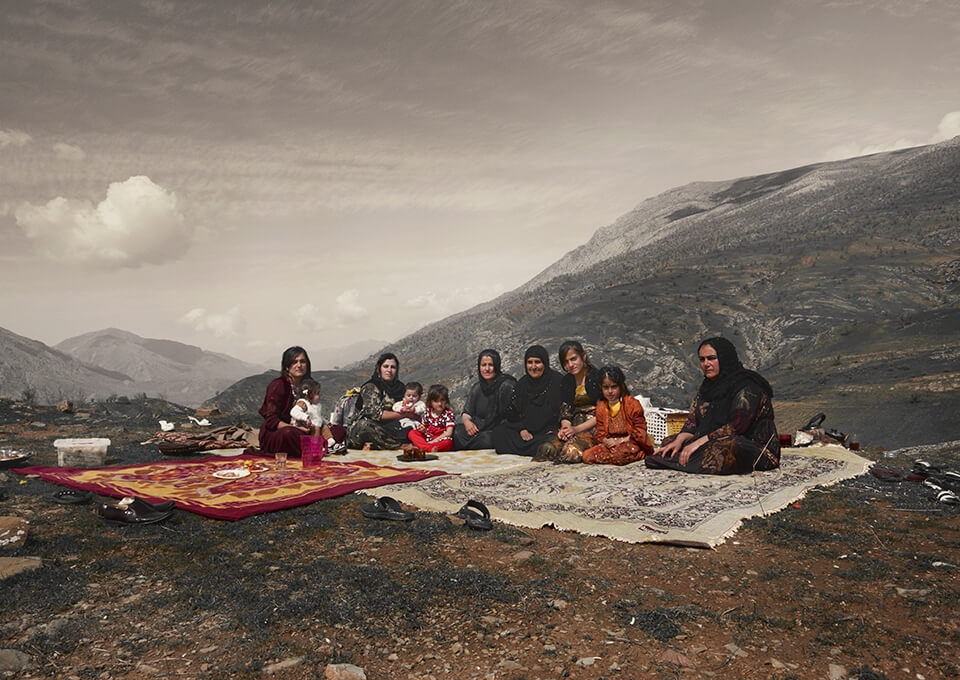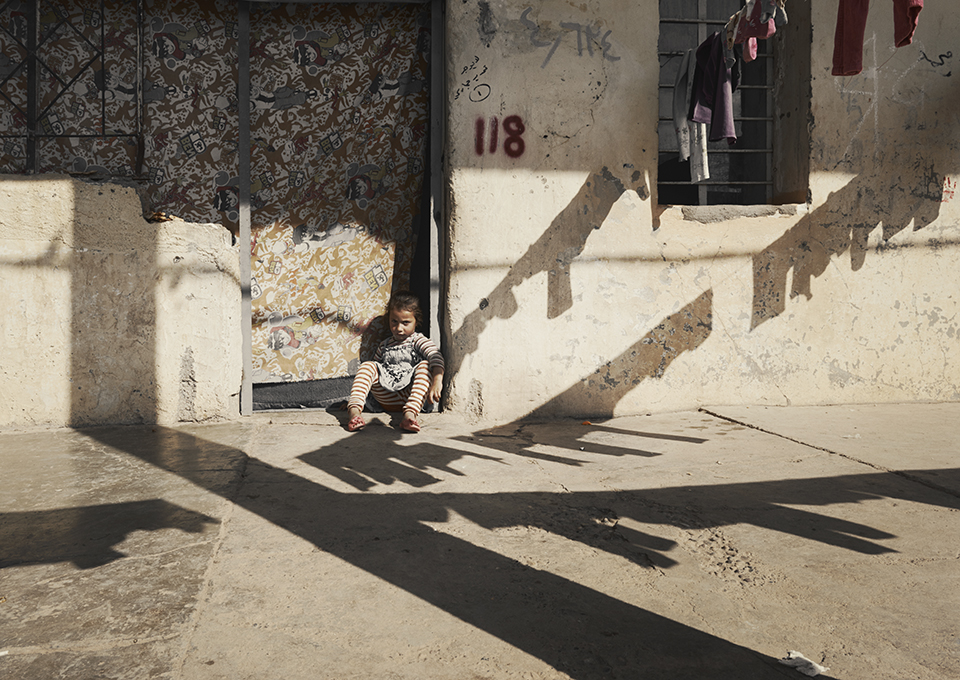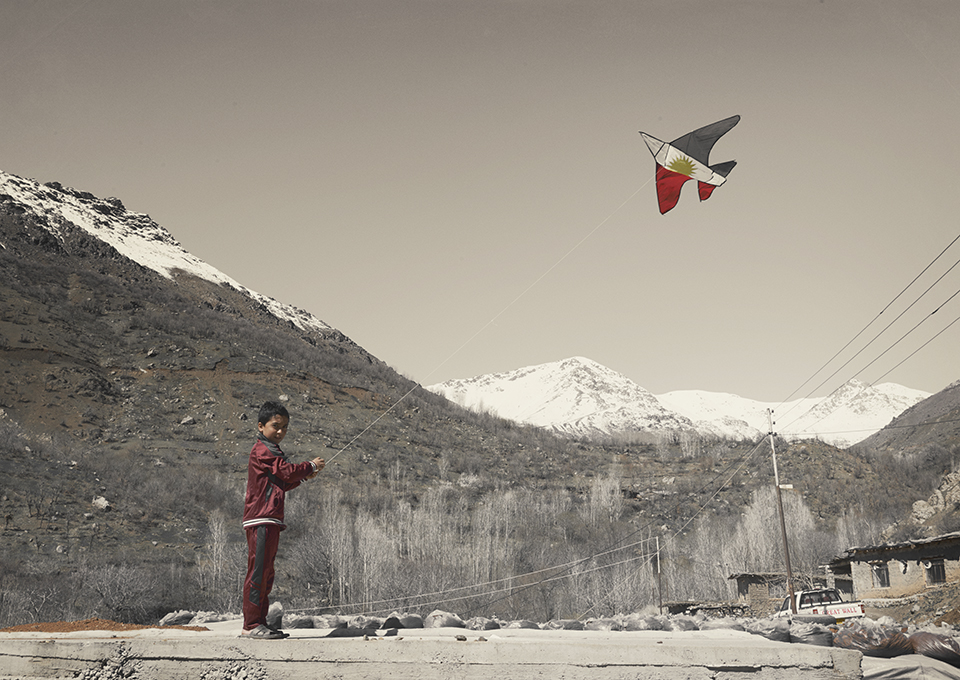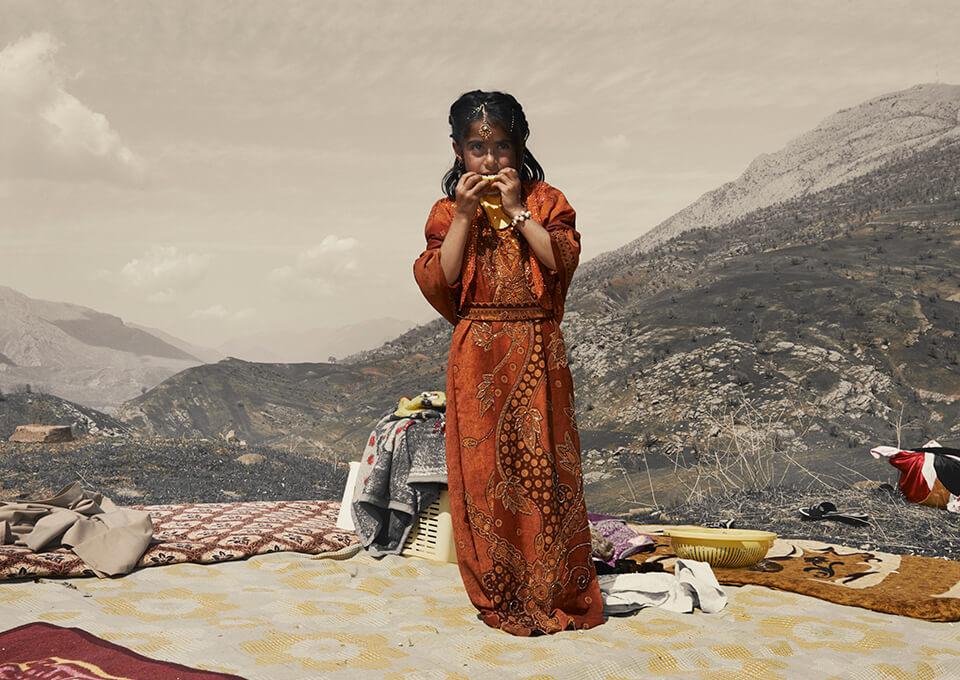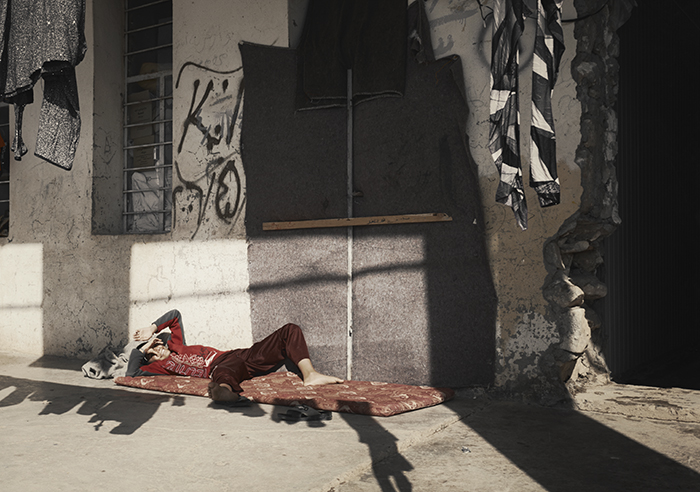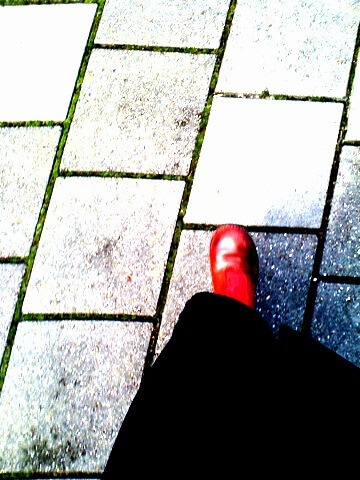On the day the calendar indicates the arrival of spring, the Kurds head en masse for the hills. They roll out rugs, fly kites and dance arm in arm over the mountains tops. Not because it’s spring but because it’s Nowruz – New Year, the most important symbol of freedom for the Kurds.
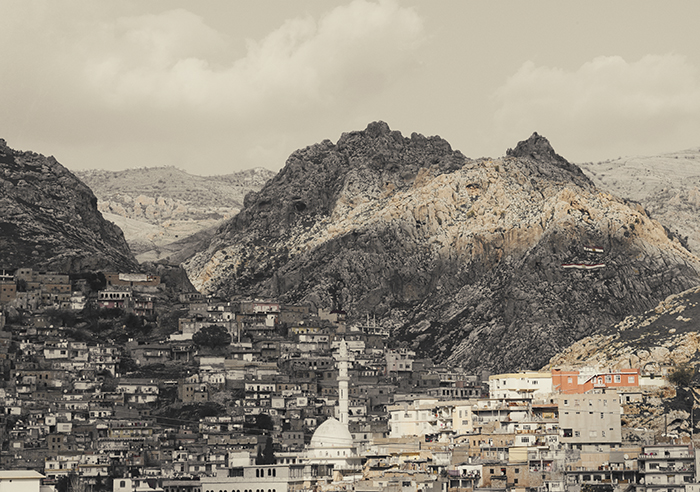
As if the asphalt had furiously forced its way through, there is red-earth debris lying on either side of the motorway. On the left, high table mountains; to the right, a green plain. Grey concrete houses make blotches in the green.
Nowruz
It’s busy on the road. Tomorrow is Nowruz, literally: new day. It’s the traditional holiday for Kurds all over the world. Honking their horns loudly, Iranian and Turkish Kurds overtake us in the overcrowded pick-up trucks they used to drive into the autonomous region.
Small igloo tents where people have spent the night are scattered along the side of the road. When I search out the shadow of a tree for a pee and stumble over blankets covering sleeping people, I realise that the tents are the luxury option.
The legend of Kaveh
We were warned. “Don’t go east. It’s too busy, stay in Erbil”. But we wanted to go to Akre and then on to Choman near the border with Iran. In Akre the legend of Kaveh is commemorated each year. The blacksmith Kaveh vanquished the devilish king Zahhak, who had reigned over the Kurdish kingdom with an iron hand for a thousand years.
After his victory, Kaveh walked up the mountain and lit a fire to signal that a dark period had ended. The light had prevailed.
Freedom
The evening before Nowruz in Akre, men still run up the mountain with blazing torches. Symbolically they are lighting the way to freedom. “Not just symbolically”, Araz would bellow in my ear in perfect English later that day. “In their history, Kurds have experienced plenty of tyrants.”
He is referring to Saddam who tried to wipe out the Kurds with chemical weapons. And the new IS threat advancing from Syria.
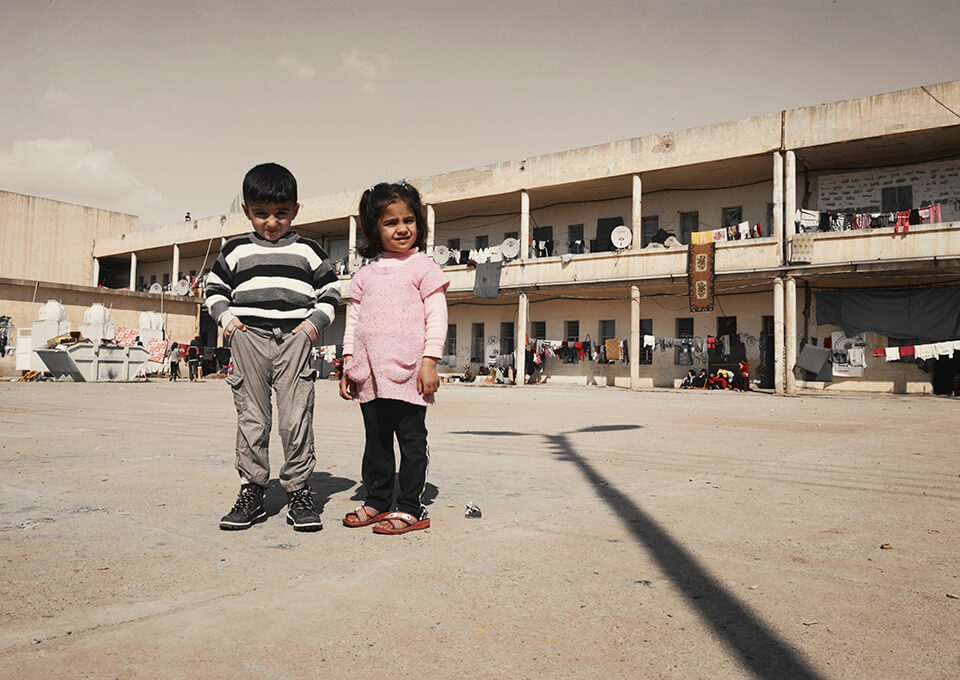
We left the capital Erbil in the dead of night. To the dismay of the entire staff of the Kurdistan ministry of Tourism who had invited us. “You may not leave the city”, the deputy minister had cautioned us sternly. “For your own safety.”
But the prospect of spending a week camping out between the concrete flats in the capital with as highlight a picnic beside the motorway on New Year’s Day had made us bold. Besides, we had Juan, the Dutch-Kurdish guide who coolly organises trips to the area, and manages to get them fully-booked as well. If we got into difficulties, at least we had someone to blame.
Demis Roussos
Mohammed, an Egyptian, is prepared to take us to Akre. He has lived in Amsterdam, so he knows exactly what Western women like: Demis Roussos! Mohammed’s style of driving is an assault on public health. He stubbornly continues to drive on the left, chain-smoking all the while. Sometimes he closes his eyes to recall a Roussos verse.
Only after anguished cries from the back seat does he manage to avoid a lorry at the very last moment every time in one of the dizzying hairpin bends. Dying in a Kurdish mountain pass to the breathy sound of Roussos’ Forever and Ever warbling from the speakers – I suspect the deputy minister was trying to warn us about something else.
Begerbi
The sun slowly rises and we eat goat’s cheese from a cardboard container. After Shaqlawa, we are stopped for a passport check. Kurdistan guards its own borders within Iraq. “Begerbi”, welcome, the soldiers say when they look at our Dutch passports. They give us a pamphlet.
Large black crosses over tents indicate that we’re apparently not allowed to camp at the side of the road. “And there’s maybe no need to mention this”, says one of the soldiers shyly, “but watch out when you’re having a pee. Kurdistan isn’t mine-free yet.”
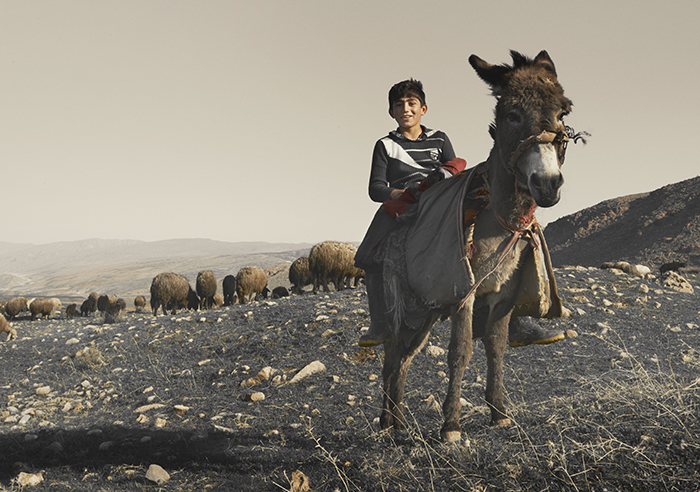
The ground is slowly turning red; the mountains are getting greyer. Brown long-haired goats are driven together by a boy on a donkey. At the roadside there’s a man leaning against a lorry. Leather jacket, cigarette dangling from his mouth and a quiff: James Dean in Kurdistan.
In the cargo space, the goat he has bought from the goatherds. “Begerbi”, says James Dean when we stop to stretch our legs. “Did you really come all the way from the Netherlands to celebrate Kurdish New Year?” In his amazement, he almost falls out of his tough-guy pose. “My family has to see this. Come with me to my house for breakfast.”
James Dean
His house turns out to be an entire village. James Dean’s father receives us. “We live here with the whole family,” he says, explaining the houses. The whole family consists of grandpa with his three wives. And actually grandpa had restrained himself because it could easily have been four.
The three women produced a total of 10 daughters and 17 sons. Who all live here with their families. The father has only one wife. “Half a wife”, he says mockingly about the woman who gave him only daughters.
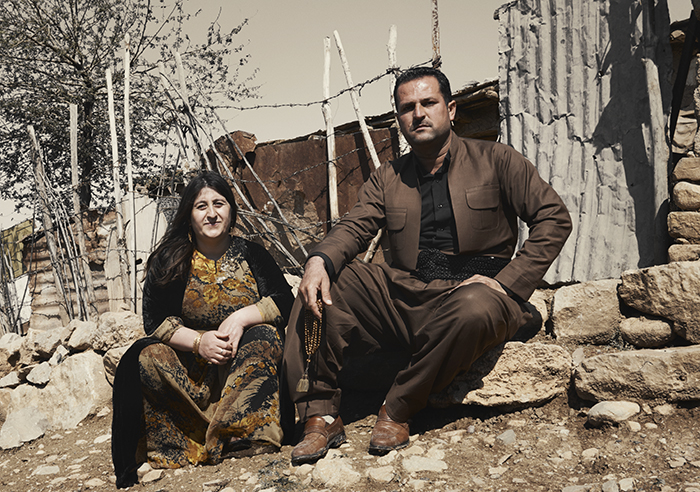
The half-wife comes in a little later – an attractive woman who places a breakfast of fresh yoghurt, egg, naan bread, honey and walnuts on the floor for us. The television is switched on especially for the guests. When we continue on our way after breakfast, the goat has disappeared from the back of the truck.
Heading north towards Akre. Spring green competes with bright yellow rapeseed. Young boys drive goats forward with a stick. In Akre there isn’t a room to be had; everything is fully booked because of Nowruz. Mohammed drops us at a refugee camp.
“Bye”, he calls and speeds away. We breathe a sigh of relief. “We still have a bridal suite”, says the man from a hotel further along the street. While Juan negotiates on the bridal suite, we go to the refugee camp.
Refugee camp
A few girls with plastic windmills greet us shyly; there is no sign of any adults. “Would you like to sing with us?” a girl asks. The photographer settles herself on the ground and the children cluster round her and start singing a song at the top of their voices.
It’s about freedom, an older boy explains. Nine hundred Kurdish Syrians have found safety here in a former army base.
They have a room and get a bag of rice once a month. A few men earn a living as taxi drivers; others work in the ceramics factory. One of the men brings us to the centre of Akre. “No, no money. You are my guests.” The old city of Akre is situated in a valley between the grey mountains. The clay-coloured houses are lost against the grey.
They are rectangular and more horizontal than vertical, as if they want to keep their grip on the mountain ridges they rest upon. Here and there a minaret rises up from the city like a phallus.
Akre
While we are being brought down to the city, we are overtaken by men in traditional costume, the checked scarf folded on their heads. Men walk hand in hand with men. Boys with boys. Women walk in small groups, wearing high heels and long dresses full of sequins.
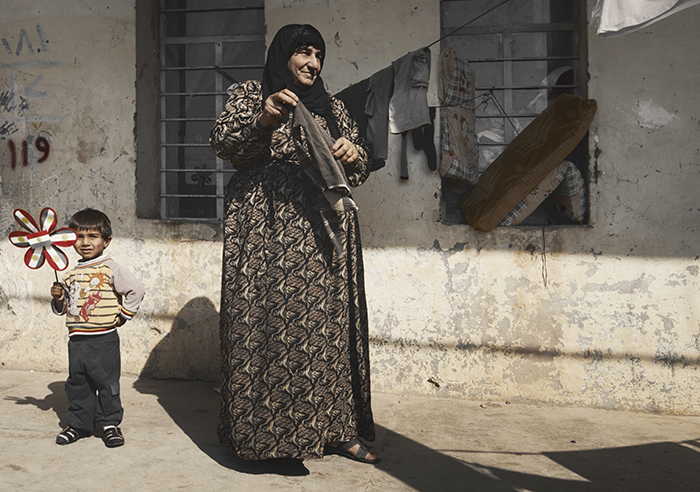
They are all heading for the plateau where the dancing will take place and where the torches can be seen at their best later. We are patently the only non-Kurds. We are watched closely from the corners of many eyes.
And then it gradually starts getting dark. We eat some nuts and sunflower seeds, sitting on a low wall. A man comes to sit next to us and introduces himself as Araz. He has come over from the United States for the celebrations.
For a while, he is a Kurd. The rest of the year he is an American soldier. In that capacity, he has bombed his own country. His family here thinks he drives a truck. He leaves it like that.
Then suddenly we see a flickering orange ribbon speeding up the mountain. It’s the boys with the torches running uphill to light the fire of freedom on the mountain. The sound of fireworks can be heard. The bangs are amplified by the surrounding mountains. As if the world is exploding. From sheer excitement, a few men shoot their rifles until they’re empty.
Ambulance
Araz grips us by the arm and pushes us towards the police who form a cordon and are frisking people who want to watch the spectacle. “Stay behind them, you’ll be safe there.” An ambulance takes away the first injured person. Hit by friendly fire.
And then as suddenly as it began, it’s all over. The torch boys have run up the mountain and walked back down again. The warmth of their flames stroked our faces and then – all at once – they had disappeared. The music has stopped; it’s come to an end.
We are propelled upwards with the crowd. I stumble over the chopped-off head of a goat that has rolled off the butcher’s pavement. Dead eyes look at me accusingly.
Wet dog
To be honest, the building on the wide boulevard doesn’t exactly look inviting. But then, it’s the only place serving alcohol. We have to descend stairs to a space in the cellar that smells like wet dog. In a dimly lit room, men are sitting forlornly at little tables with bottles of beer in front of them.
The message is clear: you’ll end up all alone in a smelly cellar if you drink alcohol. Fortunately, we have nothing to fear. “A good Muslim doesn’t serve drink to women”, the owner says and waves us away. “Please leave.”
Juan has arranged another chauffeur. Every time he puts the key into the ignition, we are treated to a chapter from the Koran. A sura for travelling safely, is the driver’s explanation for the prayer. Admittedly, it works, because he conducts us safely through the Iraqi Grand Canyon.
On the left is Rawandiz, the canyon, and on the right a landscape that looks like the green spots on a model railway. As if someone has laid plastic grass mats between the rocks. At the roadside, a pack of wild dogs stares at us. They look like St Bernards, the puppies obediently beside their parents.
Engineer Archibald Hamilton had a dream and the dream was called the Hamilton Road: a road that would run from Erbil to the Iranian border and would unite the peoples of the region. But the dream was only partly realised. The road was built, but was fought over several times.
Hamilton Road
Hamilton Road climbs higher and higher and I am happy with the chauffeur and the sura verse we heard early on when the driver started the car: “O Allah, I seek refuge by you from the bad events and unpleasant views on this journey.”
I have a little more faith in Allah than in Roussos although I have to say that there are no unpleasant views. On the contrary, they are breath-taking. The river winding deep below us accompanies us on our journey. The white mountain peaks remind us how high they are.
The taxi driver drops us in front of a house in Choman, where it’s raining pink petals from the cherry trees in flower. Juan has arranged an overnight stay with a family here. They have already left for the traditional picnic, but an uncle has waited for us.
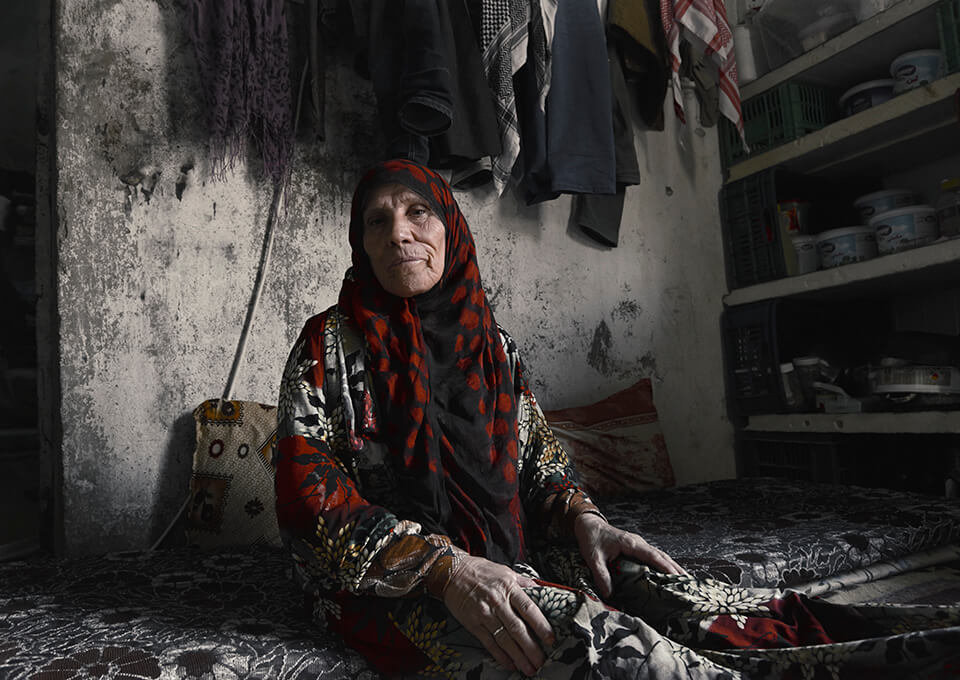
We have to eat first, because a picnic on an empty stomach is no good. Afterwards, we drive up into the mountains. Grey granite mountains separate Iraqi Kurdistan from Iran. However for the Kurds, the mountains are no obstacle.
Kurdish saying
Instead, they have provided a place of refuge on many occasions. A Kurdish saying is: Only the mountains love the Kurds. Today it’s a place to celebrate.
Everywhere among the granite, families are having a picnic on Persian rugs; it’s like a surrealist painting. As if at any moment they could take off on their carpets. The family we belong to has tackled it in a bigger way. They have confiscated a plain between the mountains with half the village.
To mark it off, the jeeps have been placed in a semi-circle. The family is sitting on rugs in long rows opposite each other. I am pressed firmly to bosoms and then placed opposite Yasin. My boy-next-door in Choman, I understand from the round of introductions.
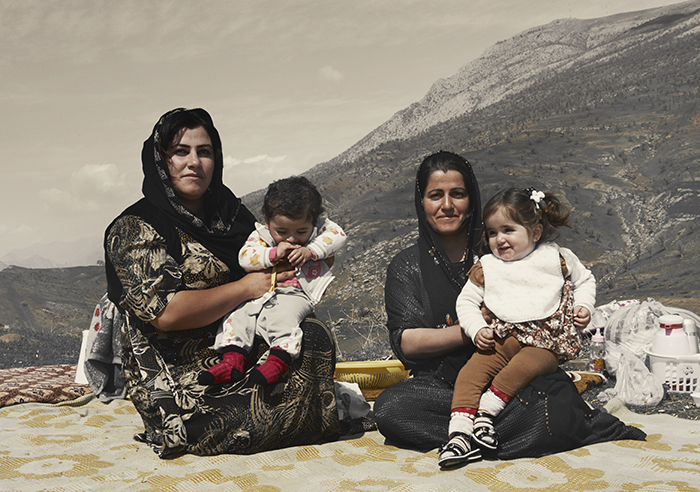
Someone pulls on my arm. The music blasting from one of the cars must be audible far into Iran. It’s time to dance. A circle is formed and men and women grasp each other’s shoulders and shake their legs high up into the air.
Children launch their kites. I need a pee. And even though people swear there are no roadside bombs here, I have another problem. “Never say you need to pee”, one of the aunts warned. “That’s rude. Say you’re going for a stroll.”
So I wander off in the direction of Iran.
Text: Anneke de Bundel – Images: Nicole Franken
Translation: Christine Gardner
This story has been published in Dutch in our book On fairies and bullet holes. You can order our book here.

